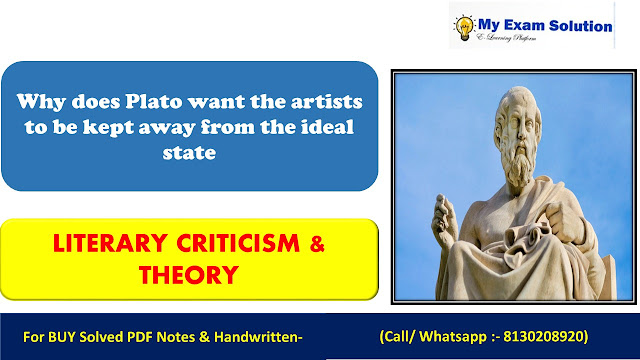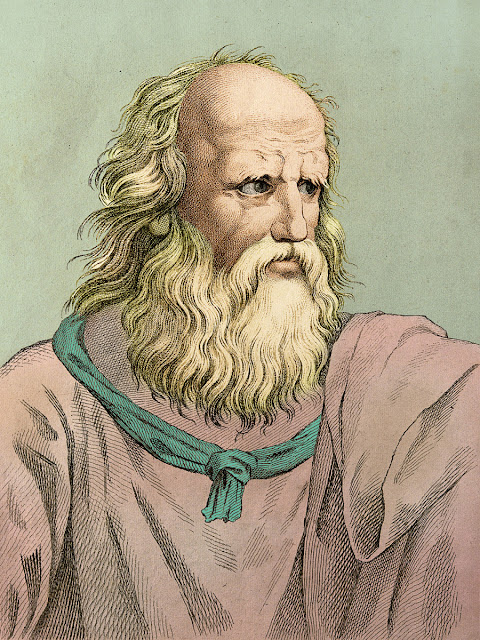Why does Plato want the artists to be kept away from the ideal state
Plato, the ancient Greek
philosopher whose ideas have influenced the course of Western thought for
centuries, is celebrated for his profound insights into politics, ethics, and
the nature of reality. Among his many intellectual legacies, one stands out as
both intriguing and enigmatic: his decision to exclude artists from his ideal
state, as expounded in his renowned work, "The Republic."
The pursuit of justice, wisdom, and
peaceful cohabitation among citizens characterized Plato's ideal society, known
as the "Kallipolis" or ideal state. Beneath the surface of his
philosophical work, nevertheless, is a decision that has provoked controversy
and discussions for decades. Remaining a subject of both curiosity and debate,
Plato's decision to bar artists from his utopian society reveals a
"shocking secret" that reveals his intricate political and
philosophical ideas.
Why does Plato want the artists to be kept away from the ideal state-In this exploration, we will embark on a journey to understand the motivations behind Plato's exclusion of artists from his ideal state. We will delve into the multifaceted reasons that drove him to make this bold and contentious decision. Along the way, we will reveal the surprising implications of this choice and its enduring impact on the realm of philosophy, art, and politics.
1.
Influence on Morality and Values:
One of Plato's primary concerns
regarding artists in the ideal state was the potential influence of art on the
moral and ethical values of the citizens. Plato believed that art, especially
poetry and drama, had the power to shape people's characters and behaviors. He
argued that exposure to certain artistic representations of immoral or decadent
behavior could lead individuals down a morally corrupt path. This concern
stemmed from his belief in the malleability of the human soul and the idea that
people are susceptible to the influence of their surroundings.
One could see Plato's
"censorship of art" as an effort to preserve the moral integrity of
the ideal society. His criticisms of art that exalted violence, promiscuity, or
other vices were particularly sharp. In "The Republic," he made the
well-known claim that "impressions of sense are almost always contrary to
reason" and that art frequently played on the emotional and illogical
sides of human nature. Plato therefore made an effort to bar artists whose
creations would compromise the moral and ethical standards of the state.
2.
Imitation vs. Truth:
Plato made a fundamental
distinction between the world of "appearances" and the world of
"reality." He believed that the physical world, as perceived through
the senses, was a mere shadow of the true reality, which was accessible through
reason and philosophical contemplation. This distinction underpins his views on
art.
Why does Plato want the artists to be kept away from the ideal state-Art, according to Plato, was inherently imitative and mimetic. It dealt with the realm of appearances and therefore lacked access to the world of truth and reality. Plato was critical of art's ability to represent the world accurately, and he believed that artists, by imitating the physical world, were fundamentally removed from the pursuit of philosophical truth.
Also Read-
Discuss On The Appropriateness Of The Title Toni Morrison’s Novel The Bluest Eye
In the ideal state, where the goal
was the realization of the highest forms of justice, truth, and wisdom, Plato
argued that artists were misguided and disconnected from the state's ultimate
purpose. He sought to keep artists away to ensure that the citizens' focus remained
on the pursuit of knowledge and wisdom rather than the deceptive allure of
artistic representations.
3.
Subversion of Rationality:
Plato placed great emphasis on
reason as the guiding force for individual and collective decision-making. He
believed that the ideal state should be governed by philosopher-kings who
possessed a deep understanding of truth and the ability to make rational, just
decisions. Art, in Plato's view, had the potential to undermine this
rationality by appealing to emotions and passions rather than reason.
Plato was particularly concerned
about the emotional impact of art, especially in the context of political
propaganda. He worried that powerful artistic works, such as epic poetry or
oratory, could manipulate people's emotions and lead them to make irrational
decisions. This was a significant threat to the stability and order of the
ideal state.
In this sense, Plato's exclusion of
artists can be understood as a measure to safeguard the integrity of the
state's decision-making processes. By limiting the emotional influence of art,
he aimed to maintain a society where rationality and wisdom prevailed over
impulsive and irrational behavior.
4.
Political Subversion:
Plato was acutely aware of the
potential for art to be used as a tool of political subversion. In his view,
artists could be powerful agents of change and could sway public opinion in
ways that threatened the established order. He was particularly concerned about
artists who might use their talents to challenge the authority of the state or
promote subversive ideologies.
Plato's fear of political
subversion through art was tied to his overarching goal of establishing a just
and stable society. He believed that a well-ordered state required a rigid
structure and unity of purpose. Artists who operated outside the control of the
state, or who had the potential to incite rebellion or discord, were viewed as
dangerous to the social harmony Plato sought to maintain.
The philosopher's exclusion of
artists, especially those with the potential to be politically influential, was
an attempt to mitigate the risk of social and political unrest. He believed
that by regulating and limiting the role of art in the state, he could reduce
the chances of artistic expression being used as a weapon against the
established order.
5.
Rhetoric vs. Philosophy:
Plato's philosophical approach,
centered on the pursuit of truth and wisdom, was fundamentally at odds with the
skills of rhetoric often possessed by artists and orators. While philosophy
aimed at uncovering universal truths and engaging in rational discourse,
rhetoric was seen as a tool for persuasion, often independent of the pursuit of
objective truth.
Plato was skeptical of the power of
rhetoric, viewing it as a means by which individuals could manipulate and
deceive others. He believed that artists and orators, with their mastery of
persuasive language and emotional appeals, could lead people astray and
distract them from the pursuit of genuine knowledge and wisdom.
In the context of the ideal state,
where the ultimate goal was the cultivation of rational and just individuals,
Plato's skepticism of the rhetorical skills of artists was a significant factor
in his desire to exclude them. He sought to prioritize the pursuit of
philosophical truth over the art of persuasion and eloquence.
6. Unpredictable Interpretation:
Plato's concerns about art extended
to the unpredictable nature of artistic interpretation. He believed that art
was inherently open to multiple interpretations and that different individuals
could derive diverse meanings from the same work of art. This ambiguity was a
source of concern for Plato, as he desired clear and unambiguous communication
in the ideal state.
The potential for art to be
misunderstood or misinterpreted was seen as a threat to the state's stability
and coherence. Plato was wary of the capacity of art to foster different and
sometimes contradictory beliefs, which could lead to ideological divisions and
moral relativism.
By keeping artists away from the
ideal state, Plato aimed to maintain a level of control and clarity in
communication and education. He believed that the teachings of philosophy, with
their emphasis on reason and truth, offered a more reliable and unambiguous
foundation for the state's principles and values.
7.
Excessive Attachment to the Sensible World:
Plato's metaphysical and
epistemological beliefs underpinned his skepticism toward art. He posited a
division between the sensible world, accessible through the senses, and the
intelligible world, accessible through reason and intellect. While he sought to
prioritize the latter in the pursuit of truth and knowledge, he viewed art as
tethering individuals to the sensible world.
Plato believed that artists, by
engaging with the sensory and physical aspects of the world, kept people
anchored to a realm of illusion and superficiality. This attachment to the
sensible world hindered the ascent toward higher knowledge and the
contemplation of eternal truths.
In the context of the ideal state,
where the ultimate goal was the cultivation of virtuous and rational citizens,
Plato's desire to keep artists away can be understood as an effort to detach
individuals from the sensory and transient aspects of existence and guide them
toward the pursuit of intellectual and moral excellence.
Conclusion
Plato's decision to keep artists
away from his ideal state in "The Republic" was rooted in a complex
web of philosophical and political concerns. He believed that art had the power
to shape individuals' values and emotions, potentially leading them astray
morally and ethically. Furthermore, Plato was skeptical of the imitative nature
of art, its potential to subvert rationality, and its ability to be employed
for political subversion.
Additionally, Plato's division
between the world of appearances and the world of reality led him to view art
as a distraction from the pursuit of philosophical truth. He was concerned that
artists and their use of rhetoric might manipulate and deceive people,
diverting them from the quest for objective knowledge. The unpredictable
interpretations of art also troubled him, as they could lead to ideological
divisions and moral relativism.
Plato's aspiration for his ideal
state was the cultivation of rational, just, and virtuous individuals, and he
believed that art posed a significant threat to this objective. By excluding
artists, he aimed to maintain clarity and control in communication and
education, detaching citizens from the sensory and transient aspects of
existence and guiding them toward intellectual and moral excellence.
FAQ.
Who was Plato, and what is "The Republic"?
Plato was an ancient Greek
philosopher and one of the most influential figures in Western philosophy.
"The Republic" is one of his most famous works, in which he explores
the nature of justice, the ideal state, and the philosopher-king.
Why did Plato want to keep artists away from his ideal state?
Plato had several reasons for
excluding artists, including concerns about the influence of art on morality
and values, the deceptive nature of imitative art, the subversion of
rationality through emotional appeals, and the potential for art to be used for
political purposes. He also believed that art kept individuals attached to the
sensory world, rather than focusing on intellectual and moral pursuits.
What was Plato's view of the imitative nature of art?
Plato believed that art, as an
imitative medium, dealt with the realm of appearances rather than reality. He
thought that art was removed from the pursuit of philosophical truth and was
inherently disconnected from the world of ideas and forms.
How did Plato's skepticism of rhetoric play a role in his view
of art?
Plato was skeptical of the
persuasive power of rhetoric, as he believed it could be used to manipulate and
deceive people. He saw artists and orators as skilled practitioners of rhetoric
who might lead individuals away from the pursuit of genuine knowledge and
wisdom.
What was Plato's ultimate goal for the ideal state in "The
Republic"?
Plato's goal for the ideal state was the cultivation of rational, just, and virtuous citizens. He believed that art, with its potential to subvert these qualities and influence emotions, posed a significant threat to this objective.








0 comments:
Note: Only a member of this blog may post a comment.